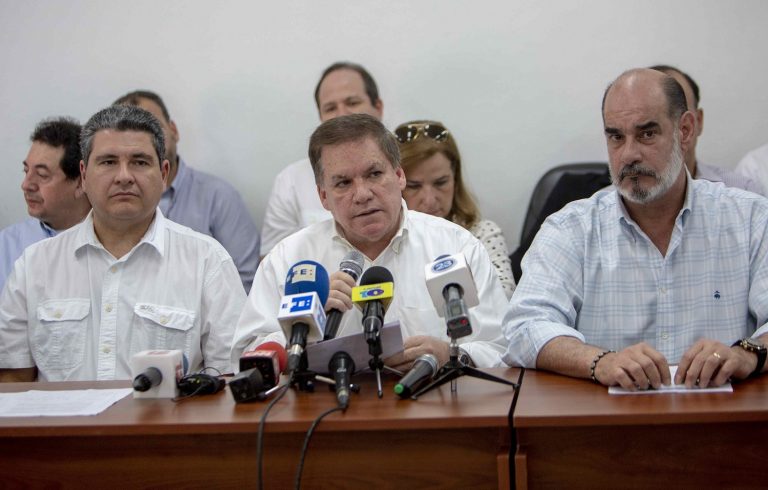26 de enero 2019

“NicaraguAmor” Cultural Caravan for Nicaraguans in the USA

PUBLICIDAD 1M
PUBLICIDAD 4D
PUBLICIDAD 5D
Private sector notes that accusations are contrary “to the principles of police action of legality and professionalism”

The president of the Private Enterprise Council (Cosep), Jose Adan Aguerri (c), speaks alongside the director of the Nicaraguan Foundation for Economic and Social Development (Funides), Juan Sebastián Chamorro (l), and the president of the farmers and ranchers organizatión (Upanic), Michael Healy (r), in a press conference held in Managua. Jorge Torres / EFE
The Nicaraguan private sector on Thursday demanded the National Police to withdraw “immediately” the public accusation in which it accuses the business associations of participating in a failed “coup d’état” last April.
The Police accused the business owners on Wednesday of being “participants in the failed coup d’état of April of last year,” used as the reason it denied the permit they requested to demonstrate in favor of a solution to the sociopolitical crisis in Nicaragua.
The police also accused the business people of acting “criminally in violation of the Nicaraguan Constitution, seeking institutional changes through violence and terror,” as well as being “promoters, instigators, responsible, for the placing of roadblocks.”
The business owners referred to are members of the Superior Council of Private Enterprise (Cosep), the American Chamber of Commerce of Nicaragua (Amcham) and the Nicaraguan Foundation for Economic and Social Development (Funides), who requested permission for a planned march for Thursday Jan. 24, and suspended due to police refusal.
“The National Police, without any legal basis, rejected our request, using political arguments contrary to the principles of police action of legality and professionalism. They accuse us of being participants in a series of absurd activities, which we strongly reject,” said Cosep in a pronouncement read by its president Jose Adan Aguerri.
Until the protests beginning in April, the private sector was one of the main allies of the Government of Daniel Ortega.
Juan Sebastian Chamorro, Executive Director of Funides, commented that the origins of the police accusations are in the “belligerent, firm and accompaniment” position taken by the private sector with the civic protests.
“From the first day of the protests, the private sector called for a march, national strikes and continues to support the relatives of the prisoners, the injured and killed during the demonstrations,” said Chamorro, who describes the accusations as “an absurd and totally threatening policy.”
In September, the Police banned all demonstrations that do not have its authorization [which they said they were not going to issue], despite criticism of this decision on the grounds that it violates the right to freedom of expression and demonstration guaranteed by the Nicaraguan Constitution.
The crisis in Nicaragua has left at least 325 dead, and over 500 imprisoned, according to humanitarian organizations. The government recognizes 199 dead and 340 detainees whom it calls “terrorists,” “coup mongers” and “common criminals.”
Ortega rejects any responsibilities in the crisis, as well as widespread accusations of serious abuses by authorities against anti-government protestors, and claims to be the victim of an attempted “failed coup d’état.”
Aguerri commented that having two narratives of what has happened in Nicaragua “will not change the outcome for the country.”
He said that throughout these months the various chambers and business sectors have been “consistent with their principles.”
The Inter-American Commission of Human Rights (IACHR) has accused the Ortega Government of being responsible for “crimes against humanity.”
On January 11, the Organization of American States (OAS) began the process of applying the Inter-American Democratic Charter to Nicaragua, due to the breakdown of the constitutional order.
PUBLICIDAD 3M
Confidencial es un diario digital nicaragüense, de formato multimedia, fundado por Carlos F. Chamorro en junio de 1996. Inició como un semanario impreso y hoy es un medio de referencia regional con información, análisis, entrevistas, perfiles, reportajes e investigaciones sobre Nicaragua, informando desde el exilio por la persecución política de la dictadura de Daniel Ortega y Rosario Murillo.
PUBLICIDAD 3D